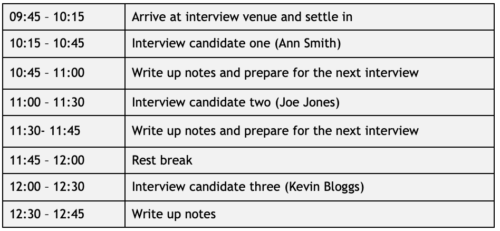Introduction
When you advertise for a new Personal Assistant (PA) you will receive application forms by email and post. This factsheet aims to guide you through the process of sorting (‘sifting’) through the applications you receive in order to decide which applicants to invite for interview (‘shortlisting’). It provides examples of how you might decide who to interview, how to arrange interviews and what you should do with the applications that you do not want to progress.
Sifting and shortlisting
This is the process that you should go through in order to decide who to invite to interview. You will need to sort (‘sift’) through the application forms you receive and decide who to interview (‘shortlist’).
After the closing date
You should be careful not to leave it too long before contacting applicants as they are likely to find other jobs if they do not hear back from you relatively quickly. However you should not rush to interview applicants who reply first as they may not necessarily be the best applicants. It is a good idea to include a closing date on your advert 2 – 4 weeks from when it is placed so that you have a specific date on which to sift and shortlist. You can extend the deadline if you have not received enough applications by this point.
‘Sifting’
Once you have familiarised yourself with the criteria for your role you should read through each application in turn and sort them into the following categories:
Interview
…applicants who meet all your criteria
‘Maybe’ interview
…applicants who meet most of your criteria
Reject
…applicants who do not meet your criteria
In order to decide which categories the applications fit into you should consider the applicant’s:
- level of experience and any required skills
- past employment and reasons for leaving
and also whether the applicant
- can work the required hours
- has filled out the application form accurately and correctly
- has any obvious patronising attitudes and prejudices
- has understood that you (and not an agency) are the employer
- can provide two appropriate referees
When sifting through applications it is vital that you avoid illegal discrimination on the basis of age, sex, disability, race, religion or belief, sexual orientation, marital or civil partnership status, gender reassignment or pregnancy and maternity. If you do discriminate on the basis of any of these protected characteristics (unless it is a genuine occupational requirement) not only will you be breaking the law but you may also be ruling out the best person for the job.
‘Shortlisting’
Interviewing can be a tiring and time-consuming process and for this reason it is best to restrict the number of applicants you wish to interview to a maximum of five. You should select the five applicants who best meet your criteria and move the remaining applications into your ‘maybe interview’ pile. If you find that you end up with very few applications in your ‘interview’ pile you may want to be more flexible about your criteria and you should look back over the applications you put in your ‘maybe interview’ pile and consider whether to invite some of those applicants to interview.
Interviewing
For more detailed information on this topic please see:
Factsheet 2.4: Interviewing skills.
Employer template 2.4(a) Example interview questions.
Suitable venues
It is completely up to you where you wish to hold your interviews. However you should ensure that it is a relatively quiet space where you cannot be overheard and where you will have sufficient space for everyone to feel comfortable.
Independent Lives can give you advice on suitable interview venues in your local community. You can of course interview in your own home if you feel comfortable doing so, however if you do you should always make sure that you have somebody with you.
Contacting people you wish to interview
Once you have arranged a suitable venue and shortlisted applicants for interview you should contact each applicant a week in advance to let them know the date, location and time of their interview and also the specifics of the job they are being interviewed for. If you are interviewing with someone else you should also agree this date with them.
Unsuccessful applicants
In addition to contacting applicants that you are inviting for interview it is also good practice to contact applicants who you have decided not to interview. When people have put time and effort into applying for your job, it is worth taking some time to let them know that their application has been unsuccessful. You never know, the next time you need a PA, they might be exactly what you are looking for, but if they have had a bad experience of applying for a PA role, they might not apply again.
They may ask for feedback on why you have chosen not to interview them. It is good practice to provide this feedback for them if you feel able to.
General Data Protection Regulation (GDPR) requires you to destroy any application form and information received relating to any unsuccessful applicant.
Sticking to a schedule
It is important to stick to a schedule when you are interviewing and therefore you should plan the questions you are going to ask in advance. The length of time you leave for each interview will depend upon the questions you plan to ask and whether you have communication difficulties. To avoid illegal discrimination, you must plan to ask each applicant the same set of interview questions.
An example interview schedule might look like the one below:
If you feel none of the candidates you have interviewed are suitable for your post you may wish to return to the applications in your ‘maybe interview’ pile and consider whether you wish to interview any of those applicants. Alternatively you may need to re-advertise your post – possibly with a revised job description and advert.

